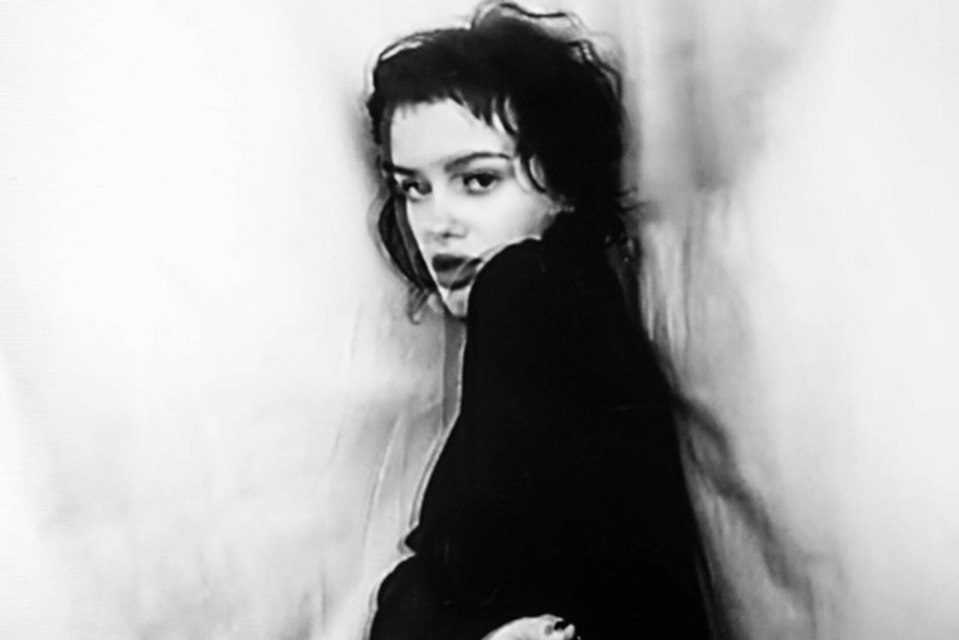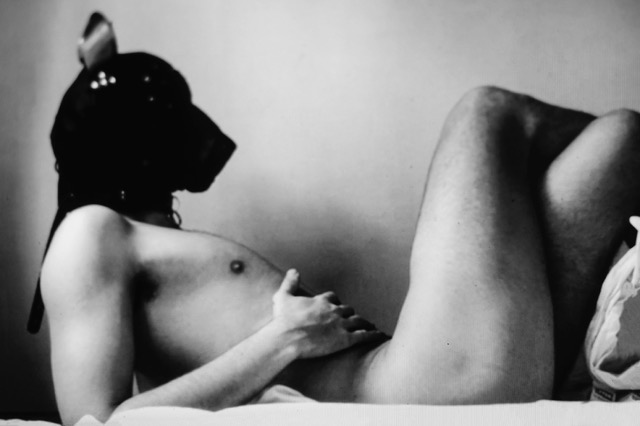
„The camera serves as a gateway to a parallel dimension, where queer identities, through the language and power of their bodies, put binary and heteronormative systems to question, the systems that have tried to alienate and suppress them for many years.“
Interview with Jetmir Idrizi, Berlin
Lieber Jetmir, selbstbewusste, sexy Persönlichkeiten entdecken wir auf den Bildern deiner viel beachteten Brasilien-Fotoserie . Eine ganz andere Stimmung eröffnet sich uns beim Betrachten von „Museum of Bad Memories“. So unterschiedlich beide Fotoserien sind, gibt es, wie ich finde, auch eine Art roten Faden, der diese und andere Arbeiten verbindet: deine Beschäftigung mit der Bildung nationaler Identität, ebenso die Frage nach Geschlechter-Identitäten und -Rollen. Worum geht es in deinem neuen Berlin-Projekt „Queerantine“; einige Abbildungen hast du mir zur Veröffentlichung zugesandt./ Dear Jetmir, self-confident, sexy personalities we discover in the pictures of your much acclaimed Brazil photo series. A completely different mood opens up to us when we look at „Museum of Bad Memories“. As different as both photo series are, I think there is also a kind of common thread that connects these and other works: your preoccupation with the formation of national identity, as well as the question of gender identities and roles. What is your Berlin project „Queerantine “ about? You have sent me some images for publication. Jetmir: My idea before moving from Buenos Aires to Berlin on February 2020 was that once: I get here, I will have the oppurtunity to show my work to different photography editors, also curators and have studio visits. But world took another turn and –– all these ideas of meeting people physically somehow vanished.
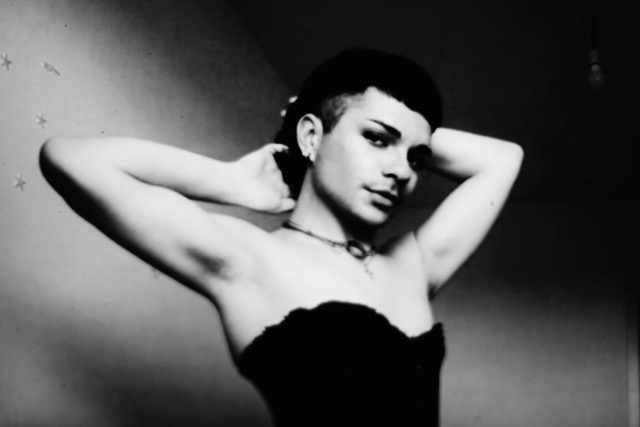
Since everything suddenly shifted to the Internet, you had to adapt to the situation. It was a matter of finding new ways to make new work. In my case, it evolved like this: I have a projector at home because, as a photographer, I’m interested in working with different artists and taking their portraits. So one day while I was talking to my friends and projecting their portraits on the wall in my living room, I got the idea to photograph them and ask them to pose for me in front of their lap-top or smart phone. I shared the photographic material I produced on my social networks.
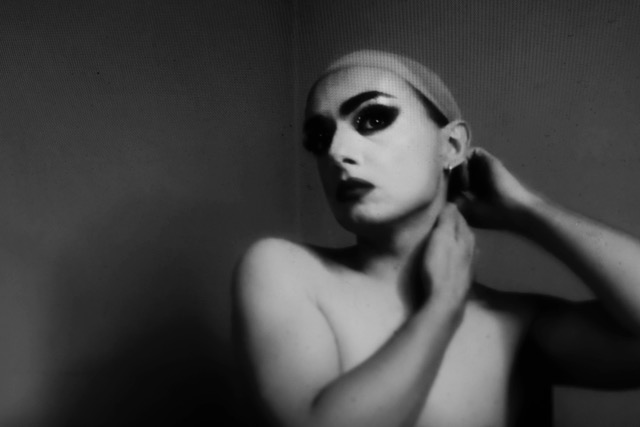
Du hast gerade gesagt, du arbeitest mit unterschiedlichen Künstlern?/ You just said you work with different artists? Yes, Actors, Dancers, Models and Musicians …
Wie war das im ersten Lockdown mit teils Ausgangssperren, woher kanntest du deine Modelle der Berlin-Serie?/ How was it in the first Lockdown with partial curfews, how did you know your models for the Berlin series? People that I photograph I mainly find through instagram, friends of friends of friends but I do sometimes stop people on the street.

One day, Xheni Karaj, activist for LGBT community rights in Albania and Director of Aleanca in Tirana, told me that she was planning to organize a virtual Pride Parade. She knew my work that I had done during my quarantine in Berlin and now she suggested me to develop a common project that we would call Queerantine. I proposed to photograph young queer people from the Balkans in their homes during quarantine. The exhibition was published on Instagram with my works.

Through my photographic lens i tried to penetrate not only into the physical isolation imposed by the authorities as a result of COVID 19, but also the spiritual, mental and physical isolation that queer people have experienced as their everyday reality throughout human history.

Und jetzt nachdem deine erste virtuelle Ausstellung stattgefunden hat, wie würdest du diese Möglichkeit beurteilen?/ Looking back, what would you say your experience was like with your first virtual exhibition? Regarding the Queerantine exhibition the experience was good, there were more then 200 people that followed us and also we have received thousands of reactions. As it happened quite at the beginning of the Pandemic, just 2 months after the lockdown, I think we did quite good considering that we did not have much experience.

Lately I have seen that people started to develop very good virtual exhibitions even with possibility to tour through it. I think this is a quite good idea to consider even when the Museums will open so that people can virtually visit exhibitions which physically they may not be able too.
Du planst eine weitere Fotoserie in Berlin. Kulturelle Traditionen, nationale Bindungen sind erneut das Thema. Diesmal beschäftigst du dich mit der kosovarischen Kultur, deiner eigenen. Sagst du uns, worum es geht? The political and economic circumstances of the 1990s in Kosovo led to a wave of emigration of many families. One of the main destinations was Germany. Currently I am working on a project which deals with the cultural preservation of Albanian/Kosovar traditions by women in the diaspora. In this process, women have a central role. Therefore, this time I would like to focus on the women from Kosovo who brought to Germany their traditional ethnographic clothing and other belongings such as jewelry and other handmade objects.
The tradition of wearing these clothes still continues and therefore even youngergenerations girls from Kosovo when they get married or in some specific events, they travel to Kosovo to buy these clothes and after the ceremony they bring them with to Germany.
With this project the idea is to contribute to Kosovar current cultural heritage by making a visual documentation of Kosovar women living in Germany, photographing them in these clothes and artifacts at the different locations and German spaces which will enable showing the dialogue between Kosovar cultural heritage and the German landscape.
Letzte Frage an dich Jetmir, wie hat sich die Pandemie auf deine Arbeit als Fotograf ausgewirkt? As for everyone else the pandemic was not easy and especially for me as an artist that I moved to Berlin exactly 1 month before it started. Nevertheless due to current improvement of technology I have to say that it wasnt that bad as one may have imagined. Personally if this had happened 20 years ago the consequences would be worst but since we live in times where internet has facilitated comunications with each other I think it made it easier for all of us to mantain in better condition our mental health. Either by being easier to commute with friends and family or in more difficult cases commutincating with professioanl psycho therapists.
Jetmir, vielen Dank für den Einblick in deine aktuellen Projekte und für deine eingereichten Fotobeiträge aus der Queerantine-Serie, die, wie ich finde, uns sehr ästhetisch und einfühlsam zugleich auf weniger beachtete Bevölkerungsschichten in Zeiten der Pandemie Aufmerksam macht.
Alle auf dieser Seite abgebildeten Fotos können erworben werden. Interessenten dafür schreiben eine E-Mail an jetmiridrizi@gmail.com oder ich leite die Bestellungen gerne an den Künstler weiter./
Jetmir, thank you for the insight into your current projects and also for your submitted photo contributions from the Queerantine series, which I think aesthetically and sensitively at the same time draws attention to less considered populations in times of pandemic.
All of the photographs featured on this page are available for purchase. Those interested in doing so should email jetmiridrizi@gmail.com or I will be happy to forward orders to the artist.
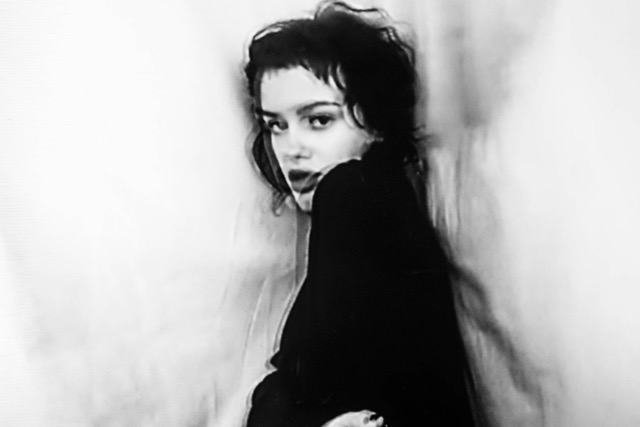
Queerantine, 30 x 40 cm, 8 motifs, Edition: 10, Signed, Inkjet Print. 300,- €
Queerantine is a photographic project about Queer identities in Balkans. As a result of forced isolation due to COVID-19, this photographic project was made possible photographing through video calls using zoom, facetime, facebook. Through my photographic lens i tried to penetrate not only into the physical isolation imposed by the authorities as a result of COVID 19, but also the spiritual, mental and physical isolation that queer people have experienced as their everyday reality throughout human history. The camera serves as a gateway to a parallel dimension, where queer identities, through the language and power of their bodies, put binary and heteronormative systems to question, the systems that have tried to alienate and suppress them for many years. Through this project, queer identities from Albania, Kosovo and the entire Balkans revolt, their bodies are protesting to overcome once and for all the labels, prejudices and collective abuses.
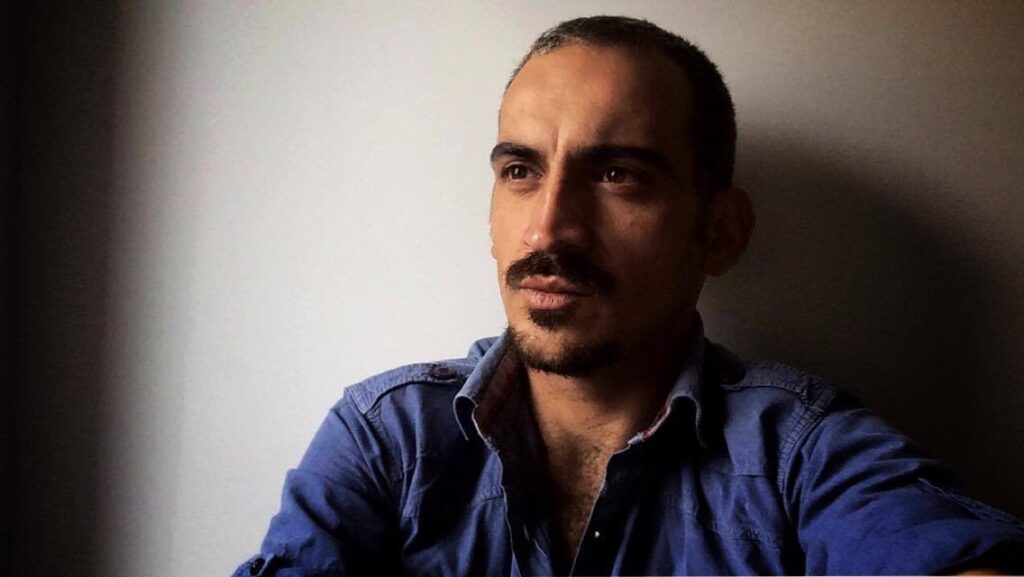
Jetmir Idrizi is an award winning photographer from Prishtina, Kosovo and currently lives in Berlin, Germany. He is a freelance photographer who has studied journalism. After working for 6 years in a daily newspaper as a photojournalist he started his career as a freelance photographer in 2012. His work focuses on social and human rights issues, memory and gender identity. He is the Winner of the first prize in Campaign Category from Sony World Photography Awards in 2016 for his project on gender identity and sexuality in Brazil and also winner of International Photography Prize Gjon Mili in 2012 awarded by National Art Gallery of Kosovo. He has been published in many international newspapers and magazines and also was part of many exhibitions.
